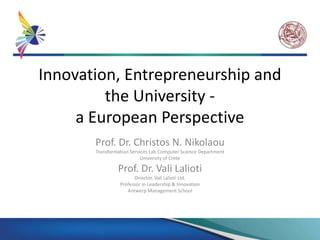Innovation and academia a european perspective - at SRII Indian Summit
- 1. Innovation, Entrepreneurship and the University - a European Perspective Prof. Dr. Christos N. Nikolaou Transformation Services Lab Computer Science Department University of Crete Prof. Dr. Vali Lalioti Director, Vali Lalioti Ltd. Professor in Leadership & Innovation Antwerp Management School
- 2. Historically… • … no culture of entrepreneurship in many European countries (but not all!) – Tim Berners-Lee, a European, invented the web while working at CERN(Switzerland) but commercial exploitation in USA! • Young people were encouraged to study to become employees of large corporations or the government. • “European innovation policy in the past has been dominated by a focus on research and development (R&D), and an assumption that innovation is about science and technology” (Lisbon Council). • But this is changing… 07/11/2014 SRII India Summit 2014 2
- 3. The effects of crisis in Europe • The problems with the banks (Ireland, Spain, …) • The problems with the debt-ridden governments of southern Europe, • The tough austerity policies and the lack of/anaemic growth in the Eurozone, • … are pushing governments and people towards empowerment of the human potential, risk taking and innovation, as alternatives to growth. 07/11/2014 SRII India Summit 2014 3
- 4. A flurry of initiatives across Europe… • Government-led: – Horizon 2020: emphasis on innovation, on SME participation, on cooperation between SMEs and universities/research centers – Member states: • Long tradition in UK (e.g. business parks at Oxford, Cambridge, Edinburgh, Southampton, etc.) • Spain: Innova (Barcelona Tech), Espai Empren, Lean Startup Creation, … • German Länder… • Greece: National competition for innovation prices (funded by banks), entrepreneurship courses in some universities (e.g. U. of Crete) • Privately-led: – Banks (usually) create investment funds, with some public funding and some VC funding. – VCs presence not as strong as in the US; VCs very weak after financial crisis. – Co-working, Incubators and accelerators,… – Maker spaces: taking advantage of 3D printing and open innovation, e.g. http://www.greatrecovery.org.uk/ 07/11/2014 SRII India Summit 2014 4
- 5. The University Link • Innovation and risk taking are naturally linked to young people (or to people with a young, inquisitive, adventurous mind), • Universities have large communities of young people, • Therefore, Universities should be natural incubators of innovation and entrepreneurship, • And this is already happening in many places around the world – USA, UK, … 07/11/2014 SRII India Summit 2014 5
- 6. What is being done today • Universities, across Europe, usually provide introductory entrepreneurship courses (make your own business plan, etc.), or more advanced ones in Business Schools, • Universities host national or regional competitions with awards for innovating ideas in business, • Universities create centers for entrepreneurs’ support (technological, legal, etc., e.g., see program Innova at UPC, Barcelona). • However, contact of students and young researchers with VCs and/or successful entrepreneurs tends to be sporadic and educational efforts tend to be fragmented and not interdisciplinary (e.g. only in business schools). • Some Universities offer advanced/innovative curricula (see UK example…) 07/11/2014 SRII India Summit 2014 6
- 7. The Team Academy Idea in the UK • Followed by a couple of Business Schools in the UK (Bristol, Newcastle and Falmouth): – First year students start with 100 pounds each and start companies in groups. – Through the three year program, they are coached in their groups by professional coaches and business school faculty (trained as coaches vs. mentors). – Students take courses as needed, from any department and any faculty; when they graduate they get a degree and a company! – So far successful and innovative. – More info at http://www.akatemia.org.uk/what-is-team- academy/ta-worldwide/ 07/11/2014 SRII India Summit 2014 7
- 8. What Remains to be Done • Develop curricula/set of courses and labs for entrepreneurship and innovation, of interdisciplinary nature, especially between schools of engineering, business, health, sciences. • Provide incentives to faculties and departments in Universities. • Systematically develop links between such programs and entrepreneurs, VCs, industry executives/senior managers, etc., at various levels: advisory, mentoring, lecturing/teaching, student projects leading, etc. • Provide university facilities, infrastructure, resources, for ideation, seeding new projects, working on proof-of-concepts, etc. • Some of the US universities programs and centers could serve as best practices (e.g. UC Berkeley). 07/11/2014 SRII India Summit 2014 8








